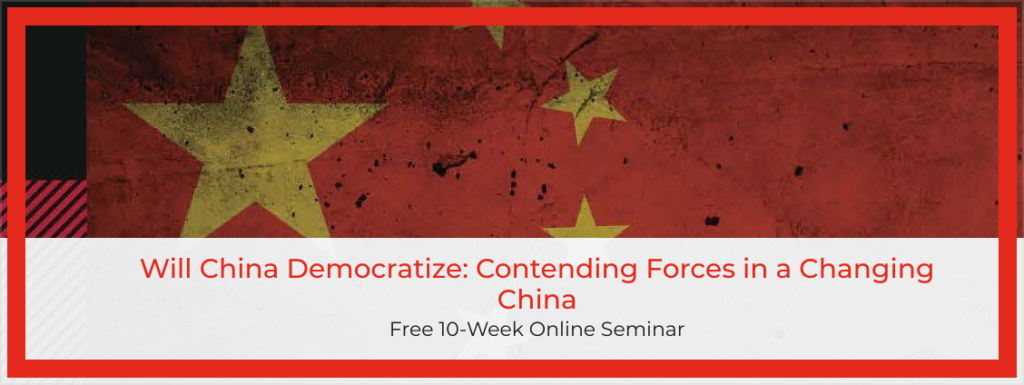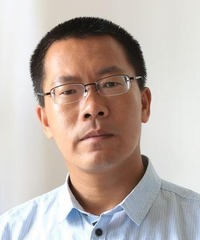Free Online Seminar Fall 2021: Will China Democratize? Contending Forces in a Changing China

Hosted on Zoom – register for link
September 24th-December 3th
10:00am-11:30am Eastern Time
Daylight savings time in the U.S. has ended. Please double check the time difference in your area!
Description: China has played a growing role on the international stage and increasingly challenges the liberal international order. Despite the country’s growing wealth, the regime and much of the population remain hostile to constitutional democracy domestically and to human rights internationally. In this 10-session seminar, Teng Biao and Andrew Nathan will analyze the forces and institutions that influence the possibilities for eventual democratic change, including the Party-state structure, ideology and values, the legal system, social change, the economy, ethnic minorities, and geopolitics.
More Information: Participants who successfully complete the seminar requirements will receive a certificate of satisfactory completion from the Dean of The New School for Social Research. In order to obtain a certificate of satisfactory completion, a registrant must attend at least 8 full sessions.
Registration will remain open for the duration of the seminar. Registrants will receive a confirmation email with the Zoom link each week.
The seminar sessions will be recorded and available to registrants.
Seminar Leaders:

Dr. Teng Biao
Teng Biao is an academic lawyer, currently Grove Human Rights Scholar at Hunter College, CUNY, and Pozen Visiting Professor at the University of Chicago.

Dr. Andrew J. Nathan
Andrew J. Nathan is Professor of Political Science at Columbia University. His teaching and research interests include Chinese politics and foreign policy, the comparative study of political participation and political culture, and human rights.
September 24: Party-State, PRC’s Totalitarianism and/or Authoritarianism
October 1: The myth of Middle-class: Market, legitimacy and China’s political economy
October 8: Culture, Complicity, and Censorship: People and the CCP
October 15: Political ideology: From Marxism to Xi-ism? (dogmatism vs pragmatism, liberalism and nationalism)
October 22: Contending Identities and Borderland Politics (Tibet, Southern Mongolian, East Turkestan/Xinjiang, Hong Kong, Taiwan)
October 29: The New Cold War? International environment and China’s democratization
November 5: Constitution, Dual State and politicized legal system
November 12: Human Rights and Criminal Justice (freedom of expression, police, lawyer, trial, detentions, torture)
November 19: Resistance and crackdown: Democracy Movement and Human Rights Movement
November 26: Thanksgiving Holiday in U.S. – No Class
December 3: Conclusion: Will China Democratize? (If so, what kind of democracy? If not, what are the other options?)
Week One Reading for September 24
Susan V. Lawrence & Michael F. Martin, Understanding China’s Political System
From 1989 to “1984”: Tiananmen Massacre and China’s High-tech Totalitarianism, Teng Biao
Optional:
What Kind of Regime Does China Have? Francis Fukuyama
Eric X. Li’s “A tale of two political systems”
Week Two Reading for October 1
The Puzzle of the Chinese Middle Class, Andrew Nathan
The Shadow of the China Miracle, Teng Biao
Optional:
Performance Legitimacy, State Autonomy and China’s Economic Miracle, HONGXING YANG and DINGXIN ZHAO
Week Three Reading for October 8
China’s Rule of Fear, Minxin Pei
Optional:
Beyond Performance Legitimacy: Procedural Legitimacy and Discontent in China, Mayling Birney
Week Four Reading for October 15
Ideological Competition With China Is Inevitable—Like It or Not, Nathan Levine
Optional:
Development of nationalism in China, Shameer Modongal
Chinese Liberalism Gone Astray, a conversation with Teng Biao
Racism with Chinese Characteristics, Magnus Fiskesjö
Week Five Reading for October 22
100 Years of Suppression: The CCP’s Strategies in TIBET, the UYGHUR region and Hong kong, HRF
Optional:
The Newsline Institute Uyghur Genocide
“Today’s Macau, Tomorrow’s Hong Kong”? What Future for “One Country, Two Systems”?, Alessia Amighini (pp. 57-79)
Taiwan for all intents and purposes is an independent country. Deal with it., Ramesh Thakur
Week Six Reading for October 29
The Chinese World Order, Andrew Nathan
Complicity in democratic engagement with autocratic systems, Eva Pils
Optional:
A New Normal for U.S. China Policy? A China File Conversation
China’s Belt and Road Initiative is Reshaping Human Rights Norms, M. Salamatin
Week Seven Reading for November 5
Fu Hualing, Duality and China’s Struggle for Legal Autonomy
Week Eight Reading for November 12
Sarah Biddulph, “Arbitrary detention”, Handbook on Human Rights in China, Chap. 18
Battered and bruised, Safeguard Defenders
Optional:
CFR: Media Censorship in China
Sarah Cook, The Battle for China’s Spirit
CECC: Freedom of Expression in China: A Privilege, Not a Right
Week Nine Reading for November 19
The Rights Defense and New Citizens’ Movement, Teng Biao
Optional:
Eva Pils, From Independent Lawyer Groups to Civic Opposition: The Case of China’s New
The Chinese Pro-Democracy Movement: 1987-1989, ICNC
Promoting Human Rights and Democracy in China, Teng Biao
November 25, closed Thanksgiving
Week Ten Reading for December 3
Is China Ready for Democracy? Teng Biao
Regime change in China is not only possible, it is imperative, Roger Garside
Optional:
Is CCP Rule Fragile or Resilient? Pei, Minxin (2012) Journal of Democracy 23(1): 27–41.


